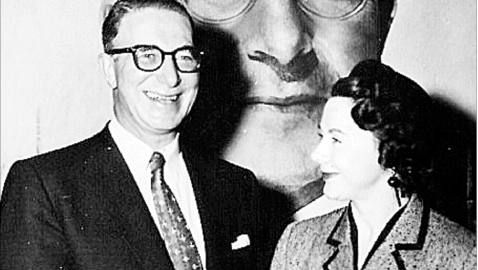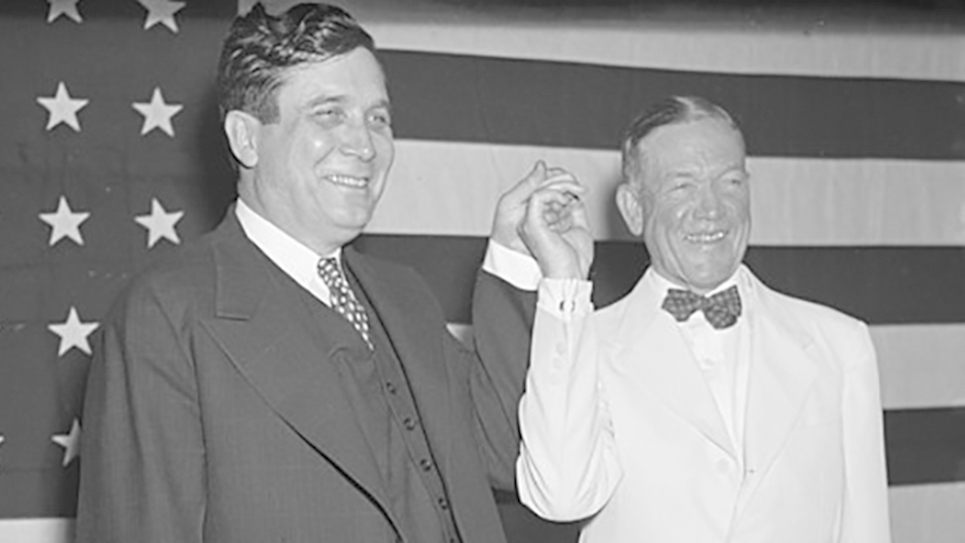Estes Kefauver had been in the United States Senate for twelve years in 1960. He had quickly risen to national prominence, making two serious bids for the Democratic presidential nomination in 1952 and 1956. Kefauver had crushed a determined opposition to his 1954 reelection to the Senate from an ambitious Congressman who had ample financial resources. Kefauver won reelection with almost seventy percent of the vote and reestablished his political primacy in his home state.
By 1960, Kefauver seemed old beyond his years and his fondness for Scotch and heavy smoking had taken their toll. Kefauver’s popularity in Tennessee was to be tested by Andrew “Tip” Taylor, a judge who had quite nearly won the gubernatorial nomination in 1958. Taylor entered the Senate race with the full support of Governor Buford Ellington and his administration. Ellington had even promised to endorse Taylor before the close of the campaign.
Ellington had not reckoned with Lyndon B. Johnson, the powerful Majority Leader of the United States Senate. LBJ had given Kefauver an assignment to the Senate Appropriations Committee and Frank Clement, Ellington’s predecessor as governor, had quickly dropped his plans to challenge Kefauver in 1960. In fact, Clement endorsed Senator Kefauver, much to the chagrin of Governor Ellington. Despite Clement’s potential challenge to Kefauver, the former governor’s endorsement of his rival was not all that far-fetched. The Kefauver and Clement organizations overlapped in many respects, with many of the same supporters and financial backers. The political philosophies of the two men were not far apart. Kefauver was thought to be more liberal than most Tennesseans, but Frank Clement’s own populist style was hardly less liberal than that of Senator Kefauver. Buford Ellington was genuinely conservative and his choice for the Democratic presidential nomination in 1960 was Lyndon B. Johnson of Texas. Kefauver was noticeably absent from the efforts of dissident liberals in the Senate who challenged Johnson’s authority. Kefauver was also absent from the 1960 Democratic National Convention and the Tennessee delegation was led by Governor Buford Ellington.
The conservative wing of Tennessee’s Democratic Party was delighted by the candidacy of Andrew Taylor. Bolstered by Ellington’s victory in the 1958 Democratic primary, they believed they might have found the candidate to help defeat the liberal element in their own party.
Kefauver had been presiding over another Senate investigation that had serious national implications for the drug industry, an investigation that was frowned upon by many doctors, as well as the Tennessee Chamber of Commerce. As recounted by Kefauver’s biographer, Charles Fontenay, the Kefauver investigation revealed the “disclosures of excessive prices for ethical (prescription) drugs, concealment of adverse side effects of drugs, and conflict of interest in the Food and Drug Administration.”
While Kefauver was winning plaudits for his investigation nationally, physicians and druggists in Tennessee were sending out literature to patients and customers in the tens of thousands labeling the senator as a socialist. Senator Kefauver was further distressed when a poll taken in the spring of 1960 showed him far behind Andrew Taylor in his reelection campaign. Kefauver lamented to at least one friend he probably should not have involved himself in the drug investigation. “Now I’ve gotten the drug people, the pharmacists and the doctors all stirred up,” Kefauver concluded.
Soon, there were rumors that the drug manufacturing interests were funneling considerable cash to the Taylor campaign. Pamphlets appeared in Tennessee calling Kefauver a Communist. Kefauver’s votes on civil rights legislation also came under fire and were the subject of fodder for Taylor’s campaign. Taylor bitterly attacked Kefauver over his support for civil rights legislation and accused the senator of being “out of step” with other Southern senators. Taylor’s campaign suffered a setback when eight Southern senators sent warm letters of support to Kefauver. John Stennis of Mississippi, Herman Talmadge of Georgia, Olin D. Johnston of South Carolina, Ralph Yarborough of Texas, John Sparkman of Alabama, Russell Long of Louisiana, Lister Hill of Alabama, and George Smathers of Florida all sent letters which Kefauver cleverly utilized in his reelection campaign. Kefauver also received help from his former running mate, Adlai Stevenson, who described Kefauver’s reelection as “absolutely imperative.”
West Tennessee was perhaps the territory believed to be the most unfriendly to Senator Kefauver, due to the fact it was both Andrew Taylor’s home as well as the area where race was perhaps the most sensitive issue. Charles Fontenay, Kefauver’s biographer, recounts the senator’s visit to Andrew Taylor’s home city of Jackson. Appearing before a crowd of a few hundred people in the courthouse square, Kefauver brought up the civil rights legislation forthrightly. Going point by point, the senator told the folks what each meant and said, “Well, I’m for that. I think it’s right. Is there anyone in this audience that’s against it?” Each time Kefauver addressed a specific point, he was applauded by his audience.
Andrew Taylor’s campaign received a blow when Lyndon Johnson came to Tennessee. By then the vice presidential nominee and John F. Kennedy’s running mate, Johnson was thought to be far more popular in the state than the Catholic senator from Massachusetts. Johnson was in Tennessee to attend a campaign rally in Nashville while the senatorial contest was raging. Taylor scurried to greet LBJ as the vice presidential candidate’s motorcade arrived. As a dismayed Andrew Taylor looked on, the big Texan saw Senator Kefauver in the crowd and walked past the challenger to enfold his colleague in a warm embrace. “Tip” Taylor then had to endure LBJ making a speech, which praised Kefauver’s service. The Texan’s talk was quite nearly a public endorsement of Kefauver’s candidacy for reelection; in fact, Newsweek flatly stated Johnson had come to Tennessee on behalf of Estes Kefauver.
As recounted by Charles Fontenay, Johnson, too, addressed the issue of race bluntly.
“Wherever I may go, I will never speak as a Southerner to Southerners, or as a Protestant to Protestants, or as a white to whites. I will only speak as an American to Americans,” LBJ declared in remarks that were extemporaneous.
Johnson’s statement clearly boosted Kefauver, as well as the Catholic Kennedy.
Before leaving, Johnson yet again hugged Kefauver while “Tip” Taylor had already departed.
Johnson’s clear preference had also caused Governor Buford Ellington some anguish. After having promised Andrew Taylor his own personal support and that of his administration, Ellington did little or nothing to help. LBJ had successfully neutralized Buford Ellington. Ellington would run for governor again in 1966 and only barely turn back a fierce challenge from John Jay Hooker, who had the support of many former Kefauver backers. Ellington ran on the slogan, “The Man of His Word.” One wonders what Andrew Taylor thought of that.
Buford Ellington was wise to have forgotten his promise to “Tip” Taylor. Election Day brought Estes Kefauver a resounding victory, winning more than sixty-four percent of the vote. It was an especially gratifying win for the Tennessee senator after so bitter a campaign. Kefauver would easily win the general election, although there were signs of an emerging Republican strength in Tennessee. The Volunteer State had twice voted for General Dwight D. Eisenhower and Tennesseans preferred Richard Nixon to John F. Kennedy.
Kefauver was also gratified when he returned to Washington, coming onto the floor of the United States Senate quietly, only to receive applause from his fellow senators. Among those coming over to his desk on the Senate floor to offer congratulations on his reelection was John F. Kennedy.
Despite the demonstration from his fellow senators, Estes Kefauver was never really accepted by those senators who comprised the bloc who ran the institution. Kefauver’s erstwhile enemy, the late Senator K. D. McKellar, had been one of the senatorial barons who exercised enormous influence inside the Senate. McKellar was part and parcel of the Senate establishment, while Kefauver remained an outsider for his entire career inside the United States Senate. Much of the liberal establishment disliked Kefauver and according to Charles Fontenay, national columnist Stewart Alsop summed the disdain of many liberal elitists who frowned upon the senator from Tennessee.
Alsop concluded many of the liberal intellectuals believed Kefauver “lacks the elegance and eloquence liberals like in their heroes.” Indeed, John F. Kennedy and the fabled “Camelot” of administration were defined largely by elegance and eloquence. Not coincidentally, those same traits were applied to Kefauver’s old foe and running mate, Adlai Stevenson. Yet even Stevenson did not possess the casual elegance of the handsome young Kennedy and his strikingly beautiful wife, Jacqueline.
Unlike Senator McKellar, Kefauver never really built an organization around himself. Kefauver did have thousands of friends and supporters all across Tennessee who rallied to his aid each time he ran, but Senator Kefauver never concentrated on the patronage and machinery of politics. Kefauver never really openly supported other candidates in races, save for his friend Gordon Browning in 1952, but that was also largely because Kefauver understood what a toll was exacted due to Browning’s help at the Democratic National Convention that year. The fact Browning lost decisively to Frank Clement likely did not encourage Kefauver in making future endorsements of other candidates.
Southern senators had for decades been renowned for their oratory; many of the acknowledged best speakers in the country hailed from the South. Yet, Estes Kefauver remained a shockingly bad speaker. Kefauver could manage to mangle the simplest of sentences and according to his biographer, “had a remarkable propensity for putting his foot in his mouth on the most serious issues.” Fontenay also quoted a national reporter who covered a Kefauver campaign appearance in South Dakota. Clearly, the reporter was underwhelmed.
“It was a drab speech to a drab little audience. But afterward, they crowded around him with genuine enthusiasm. Something had happened. They got it. I didn’t.”
The mystery of Estes Kefauver’s personal appeal was one many people didn’t quite get.







